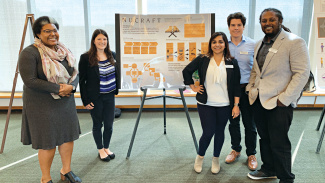My Experience With Michigan Ross WMBA: Challenging And Rewarding

By Nicholas Brown, MBA ‘21
As I reflect upon my experience with the Michigan Ross Weekend MBA program on a flight to a class weekend for the program, I can pretty much sum up my experience thus far in two words — flexibility and access.
If you work in renewable construction, you can never anticipate where the next project is going to take you. Only in a program with flexibility like the Ross WMBA program, can I live in Atlanta, Georgia, and work in Reading, Kansas (a town where there is more livestock than people), all while pursuing an MBA from a premier institution. I can take an accounting final in Costa Rica, attend group meetings from an F-150 in the middle of a cow pasture, and still fly up to attend class with elite professors and a group of diverse classmates.
The other side of the coin, and one of the reasons I picked Michigan Ross is the program’s accessibility. Access to accomplished classmates, world-class professors, and an unrivaled alumni network is expected from an institution like Ross. However, Ross has also given me access to something that I didn’t know was just as important — problems. Ross has introduced me to problems that corporations and nonprofits alike have attempted to solve, ones that most people can only theorize solving. And we were not only provided information about these particular issues; my classmates and I were also challenged to find solutions. Out of all the problems Ross proposed, three of them made a particular impression on me.
The first centered around issues of income inequality. Students were split into groups and given two days to come up with a plan for Amazon to reach the bottom of the pyramid – the 60 percent of the world who earn less than $3,000 a year. The second problem was a part-time MBA case competition set up to allow students to work with a Japanese auto parts manufacturer to illustrate different ways to create a platform for the future of urban mobility. The third problem provided the opportunity to work with a luxury furniture manufacturer to develop a marketing plan geared toward helping them defend and embolden their position against the coming wave of disruption.
Coming from a world of D10 bulldozers, half a million-pound transformers, and 600-foot-tall wind turbines, I greatly value the access to such problems that are outside the scope of my normal life and work. These are issues that force you to think outside of the box and outside of your comfort zone. I look forward to working through new challenges with the MAP crisis challenges and other competitions. If I could make any suggestions to myself or anyone else, it would be not to shy away from, but run towards, these challenges throughout the various programs and beyond.
There is a vast world out there, with a wide range of issues, but Ross gives you the tools and the chance to solve them.







